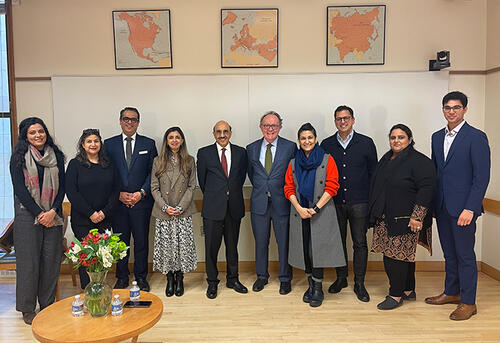On Saturday, February 11, the South Asian Studies Council was honored to welcome Masood Khan, Ambassador of Pakistan to the United States Ambassador Khan to deliver a talk titled “Pakistan-U.S. Partnership for Regional Peace and Stability.” Ambassador Khan was in New Haven as a part of a trip throughout New England that also saw him join a panel at the South Asian Youth Initiative on “Environmental Justice and Public Health” earlier Saturday morning. Khan has had a long and distinguished career. From 2016–2021 he served as President of Azad Jammu and Kashmir, an administrative territory of Pakistan. He was previously Pakistan’s Ambassador to the United Nations (Geneva), China, and the United Nations (New York) in a stretch from 2005 to 2015.
Khan began his talk, which was delivered without prepared remarks, with a history of Pakistan and its relationship with the United States over the more than 75 years since Partition. He noted, smiling, that after independence Muhammad Ali Jinnah, Pakistan’s first prime minister, could have traveled to Washington, D.C. or Moscow. “He chose Washington.” Khan singled out August 8, 2021, the date of the U.S. withdrawal from Afghanistan, as a turning point in the relationship that developed after that fateful choice. With the U.S. winding down its global War on Terror, Pakistan, he said, must be a partner to the United States in peace as well as war, a fundamental shift from the past four decades. Khan argued that areas of collaboration between the two countries could be categorized into security and non-security partnerships. The latter category includes trade; energy and climate change, including Pakistan’s energy transition; public health, including disease eradication; and education, including sending more students from Pakistan to U.S. universities. Given the setting of the talk, higher education was a particular focus for the Ambassador. He explained that through its Higher Education Commission, Pakistan has the ambition of producing at least 10,000 PhD students in the next decade, including 1,000 fully supported by the Pakistani government to attend American universities.
Khan concluded his remarks with a pitch for investment in Pakistan, citing its young and growing population, emerging startup scene, solidifying manufacturing base, and high potential returns for investors. He then took questions from the audience, starting with three from SASC Student Fellow Daevan Mangalmurti about international climate negotiations, Pakistan’s relationship with China, and key investment sectors in Pakistan. Audience questions addressed the tumultuousness of the U.S.-Pakistan relationship over the past 40 years, the necessity of people-to-people exchanges, and challenges to trade and the peaceful resolution of tensions in the disputed region of Jammu and Kashmir.
Byline: Daevan Mangalmurti


